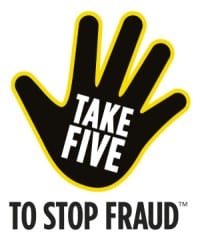Helping you stay safe from common fraud…
We’re a mutual building society and we’re proud to deliver a first-class customer service consistently. Our members are at the heart of what we do and we’re  committed to helping people towards a safe and secure financial future. One important part of this is helping you stay safe against fraud.
committed to helping people towards a safe and secure financial future. One important part of this is helping you stay safe against fraud.
May 2022 Update- Holiday Scams, be prepared this summer.
With summer fast approaching, attention starts to turn to holiday season. Although this is a time to get away from everything and to relax, it can be a perfect opportunity for criminals to take advantage. From fake caravan or motorhome listings to “too good to be true” offers for holidays, villa rentals and holiday lets, criminals use a variety of methods to trick us into handing over our money and information.
Caravans and mobile homes purchase scams
The last thing you want before embarking on a staycation is to find out that the caravan or motorhome that you think you’ve purchased doesn’t exist.
Criminals advertise fake listings on auction sites and social media, using attractive prices to tempt people into believing they’re getting a good deal, when in reality they simply don’t exist or don’t arrive once paid for. Payments are usually requested via bank transfer as opposed to using the recommended secure payment method.
However, criminals are also asking people to pay using fake invoices to trick them into thinking that all is as it should be. Subsequently, the criminal then fails to send an invoice, at which point the buyer is contacted by someone pretending to be a representative from a payment service provider and receives a reference and bank account number for payment to be made into. Ultimately, the buyer doesn’t receive their goods as payment has been made into an account controlled by a criminal so customers should be on the lookout for scams.
Holiday cancellation refund scams
Having your flights or holidays cancelled by flight operators and travel companies can be stressful, even more so when you’re seeking a refund. Criminals use these opportunities to defraud people in a number of ways, including via phishing emails, ‘spoofed’ calls or social media posts or ads.
Phishing emails
Criminals send out phishing emails advising people how to claim refunds with links leading to fake websites that are used to steal personal and financial information or to infect your device with malware. These emails may appear to be from airlines, banks, travel providers or other trusted organisations using official branding to convince you they’re genuine.
Spoofed calls
Criminals call you pretending to be representatives/ ’refund agents’ from impacted organisations or from your bank claiming they can help you get an immediate refund if you provide them with your bank details. You may be asked to pay an upfront fee as payment for handling refund claims. Once your bank details have been shared with the criminal you fail to receive your refund and they have access to your money.
Social Media
Criminals can create fake social media accounts imitating real organisations, often claiming to be able to assist with refunds/claims. The links contained in the posts ultimately divert you to fake websites that require your personal and financial information in order to proceed. However, once your details are entered you fail to receive any help and could subsequently become a victim of a scam.
Holiday booking scams
Whether you’re booking that dream holiday or just a short break, make sure you do lots of research into your accommodation, flights or the package that you’re hoping to book to ensure it’s genuine. Criminals often set up fake websites offering ‘cheap travel deals’ which are used to obtain your money and information. Websites may look like that of genuine organisations but subtle changes in the URL can indicate that it’s fraudulent. You may also be directed away from secure payment channels to ‘avoid missing a booking’ to pay via bank transfer or through fake payment pages. The tickets advertised may be fake or not exist.
You may also receive phishing emails advertising “too good to be true” offers or prices for package holidays or flights. When the link contained is clicked, you’re directed to a fake website designed to obtain your personal and financial information.
How to stay safe when travelling abroad
Having your card stolen, falling for a scam, or not being able to use your cards is a huge inconvenience, especially if you are abroad. However, following some simple, common sense precautions before, during and after your trip overseas can help minimise your chances of having any difficulties.
For tips on how to ensure your time abroad is hassle-free, whether it be before you go overseas, during or when you get back, please follow this link: https://www.takefive-stopfraud.org.uk/advice/general-advice/holiday-scams/
If you believe you’ve fallen for a scam, contact your Bank or Building Society immediately on a number you know to be correct, such as the one listed on your statement, their website or on the back of your credit or debit card.
Report it to Action Fraud on 0300 123 2040 or via actionfraud.police.uk. If you are in Scotland, please report to Police Scotland directly by calling 101 or Advice Direct Scotland on 0808 164 6000.
Take Five
Take Five is a national awareness campaign led by UK Finance and backed by Her Majesty’s Government delivered with, and through, a range of partners in the UK payments industry. They offer lots of hints and tips and they provide straight-forward and impartial advice on financial fraud prevention
Consumers are urged to follow the advice of the Take Five to Stop Fraud campaign to:
- Stop: Taking a moment to stop and think before parting with your money or information could keep you safe.
- Challenge: Could it be fake? It’s ok to reject, refuse, or ignore any requests. Only criminals will try to rush or panic you.
- Protect: Contact your bank immediately if you think you’ve fallen for a scam and report it to Action Fraud.
The campaign urges you to stop and consider whether a situation is genuine – to stop and think if what you’re being told really makes sense.
Visit the Take Five website for their advice and to access the helpful material they provide. Here you can find more information and advice on how to protect yourself .
Are you Scam Savvy?
Criminals are turning to more sophisticated ways to take your money, whether through online offers, emails or telephone calls. Can you outsmart them? Put your ability to spot a scam to the test with Take Five's spot a scam Quiz and see if you are scam savvy.
Some important rules to follow to keep you safe online from common frauds:
Things to look out for in emails…
- If it sounds too good to be true, it probably is. Be cautious of an email subject line or content that looks false or causes suspicion.
- Look out for poor spelling and grammar in emails. It can be a clear sign of phishing.
- Be suspicious of requests for lots of personal information. Ask yourself why do they need to know that? Or what is its relevance?
- Is there a deadline or countdown? Fraudsters will often use pressure to try and get you to act quickly and provide what they want.
- Check the sender's email address; hover your cursor over the senders email address as it’s listed in your inbox. If the website displayed isn’t in the name of the alleged email sender, it could be a phishing email.
- If you receive an email from an unknown sender, don’t action it without verifying the sender.
- Delete any suspect emails or text messages. Don’t forward it on to anyone as this can add some credibility and encourage the recipient to follow any instructions.
- Check the person who called you, or who sent you an email from an organisation, is genuine. Call them back on a verified number from the organisation's website or telephone directory.
- If you believe you have received a fake email, phone call or text message, contact the genuine party to notify them.
- Be careful if you have to allow anyone to have remote access to your PC or device. You must be certain the request is coming from a trusted source.
A quick jargon buster…
Phishing
Phishing is where a fraudster will send an email which appears to be from a legitimate company, attempting to obtain personal details from you. These phishing emails often contain a link directing you to a website which will ask you to re-verify your details.
But beware, this will usually be a fake website but it will look real and could also trigger the unknowing download of a virus to your PC or device. If the fraudster gets hold of your password and personal details they can use this information to commit further crimes.
Vishing
This is very similar to phishing but takes place over the phone. Instead of getting you to go to a website, the fraudster may request personal details from you directly or ask you to transfer money to an account.
Smishing
Just like vishing, fraudsters contact you by phone but instead of a phone call it is done using text messages where you are usually asked to follow a link or call a telephone number. This is called smishing.
Twishing
Again, this is another form of phishing but this scam takes places on Twitter and often involves getting users to hand over their usernames or passwords.
Action to take
If you think you have been the victim of fraud you should report this to Action Fraud on 0300 123 2040 or visit actionfraud.police.uk
Please note: This information does not constitute legal or financial advice given by Harpenden Building Society. No reliance should be placed on this guide and you must make your own decisions, we recommend that you seek independent advice if you have any questions or queries.
